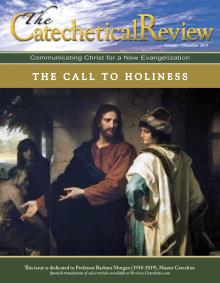Amid the dark shadows that have at times been cast over the face of the Church, too often obscuring for our contemporaries the clear light of Christ shining from her (see Lumen Gentium n. 1), we need to focus anew on the universal call to holiness. It is very striking that, amid all the crises of the 20th Century, the central message of the Second Vatican Council was simple, direct, and clear: that every one of us, in every state of life, is called to the fullness of the Christian life and the perfection of love; that is, we are called to become nothing less than a saint (cf. LG Chap. 5). This call was beautifully expressed in the prayer of Saint Paul: “May the Lord be generous in increasing your love…May he so confirm your hearts in holiness …when our Lord Jesus Christ comes with all his saints” (1 Thess 3:12,13).
The only renewal of the Church that will ever matter is renewal in holiness. This is why only saints have resolved the crises the Church has faced throughout history and why they have always proved to be the great evangelizers. Amid the challenge of a new evangelization of western societies, it is urgent to recall this one goal of every Christian life, for it is through the saints that the true face of the Church shines out. While they have their place, no pastoral program, no discussions amongst us, no diocesan re-organization or re-structuring can ever accomplish this without our striving to become the saints God has called us to be. We are led, therefore, to pray ardently: May the Lord increase our love and confirm our hearts in holiness (cf. 1 Thess 3:12, 13).
It is both our Christian calling and the ultimate goal of every human life to become a saint. Pope Francis repeats a striking phrase: “the only great tragedy in life, is not to become a saint” (Gaudete et Exsultate n. 34). A saint is someone who reaches the complete and everlasting happiness of heaven. We might say that holiness is happiness, which is why Pope Francis insists: “The Lord wants us to be saints and not to settle for a bland and mediocre existence” (GE n. 1), for it is only by being holy that we can be truly happy. He continues, “Do not be afraid to set your sights higher, to allow yourself to be loved and liberated by God” (GE n. 34). For holiness is “the extent that, by the power of the Holy Spirit, we model our life on Christ’s” (GE n. 21). We can never reach this goal by our own unaided efforts, but by the grace of God we can!
Each of us needs to re-discover for ourselves that “In the Church, holy yet made up of sinners, you will find everything you need to grow towards holiness” (GE n. 15). In daily prayer, frequent confession, and above all in the Holy Eucharist, we are given the divine grace to reach this goal. Pope Francis expresses his hope that “the whole Church (will) devote herself anew to promoting the desire for holiness,” and invites us all: “Let us ask the Holy Spirit to pour out on us a fervent longing to be saints for God’s greater glory, and let us encourage one another in this effort” (GE n. 177).
We also look to the example of the saints who have already reached this goal and whose example shines out for us. In Our Lady, “full of grace,” we find the one who accompanies us along the path to the one goal of holiness to which we are all called. In the beautiful words of the Second Vatican Council, we know that in the most Blessed Virgin Mary the Church has already reached perfection, and in our struggle she shines out for us as a sign of certain hope and consolation until the day of the Lord shall come in splendor (Cf. 2 Pet. 3:10, LG nos. 65, 68).
Bl. John Henry Newman (to be canonized on October 13) spoke of the Second Spring of the Catholic Church in England, amid both the promise and storms of his times. He evoked a supernatural assurance with these memorable words: “One thing alone I know, that according to our need, so will be our strength. One thing I am sure of, that the more the enemy rages against us, so much more will the Saints in Heaven plead for us; the more fearful the trials from the world, the more present will be our Mother Mary, and our good Patrons and Angel Guardians…We shall not be left as orphans; we shall have within us the strength of the Paraclete, promised to the Church and every member of it.”[1]
The Most Reverend Mark Davies is the Bishop of Shrewsbury, in England.
Note
[1] Blessed John Henry Newman, Sermon “The Second Spring” preached at Saint Mary’s Oscott, July 13, 1852.
This article originally appeared on page 25 of the printed edition.
This article is from The Catechetical Review (Online Edition ISSN 2379-6324) and may be copied for catechetical purposes only. It may not be reprinted in another published work without the permission of The Catechetical Review by contacting [email protected]

















